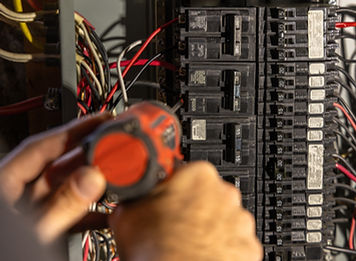
What factors influence pricing for electrical work?
The price of electrical work can vary depending on several key factors — from the complexity of the job and the condition of existing wiring, to code requirements, accessibility, and materials involved. Understanding what goes into pricing helps ensure transparency and sets realistic expectations for your project.

01
Electrician's Rates
Licensed electricians typically charge between $65 and $130 per hour, depending on service area and experience level. Master electricians command higher rates than journeypersons, who in turn bill more than apprentices.
02
Materials
Material costs vary significantly depending on the product type, brand, and functionality. For example, circuit breakers from different manufacturers (e.g., Siemens, Square D, Eaton) can vary widely in price. Specialty products (smart switches, surge protectors, automation gear) also command premium prices.


03
Travel & Supply Distance
Travel time to your home and nearby supply stores is often factored into the hourly or project-based rate, especially in rural areas.
04
Age of the Home
Older homes (pre-1980s) often require more complex work to meet modern safety codes. For instance: If an outlet lacks a bonding (ground) wire, it must be upgraded using a GFCI outlet or GFCI breaker, which cost significantly more—up to 10 times the price of standard versions. Many older homes use wiring without ground wires, especially those built before 1962.


05
Wiring Accessibility
Installations in open framing or unfinished areas (like basements or crawl spaces) are quicker and less costly. Fishing wires through finished walls or ceilings requires more labour and specialized tools, increasing costs.
06
Work Area Conditions
A cluttered or crowded workspace slows down progress. Clients can help reduce labor time by ensuring the area is clear of furniture, valuables, pets, and people. For safety, it’s important to restrict children and pets from the work area during the job.


07
Permit Requirements
Electrical permits are often required and are based on the total cost of the job (excluding GST). Failing to obtain a permit can result in fines, penalties, or legal action.
08
Code Compliance Upgrades
All work must meet the Canadian Electrical Code (CEC). This may require upgrades even in small projects. For example, since 2015, most household receptacles must be protected by Arc Fault Circuit Interrupters (AFCIs). AFCI receptacles and breakers are significantly more expensive than standard ones—up to 26x and 8x more, respectively.


09
Unforeseen Issues
Installations in open framing or unfinished areas (like basements or crawl spaces) are quicker and less costly. Fishing wires through finished walls or ceilings requires more labour and specialized tools, increasing costs.
